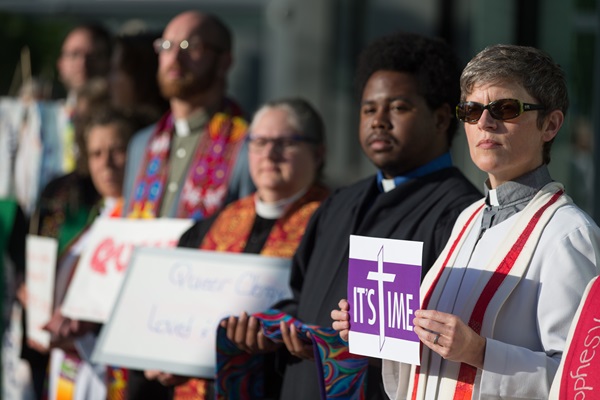After over five decades of strife and adoption of policies that increasingly excluded non-heterosexual persons from the clergy and receiving the full ministries of the church, the 2024 General Conference removed all of those restrictions and replaced them with a series of affirmations and agreements about how all persons will be treated with respect to their sexuality or gender identity. These updated provisions are in entire effect as of January 1, 2025. Some of them went into immediate effect as of the close of the 2024 General Conference (May 3, 2024).
Statements on Human Sexuality available online
The United Methodist Church affirms human sexuality "as a sacred gift and acknowledge that sexual intimacy contributes to fostering the emotional, spiritual, and physical well-being of individuals and to nurturing healthy sexual relationships that are grounded in love, care and respect." (2024 Book of Discipline, Paragraph 162.C). This applies to all persons, regardless of sexual orientation or gender identity.
Further, The United Methodist Church affirms that Christian marriage is "a sacred, lifelong covenant that brings two people of faith, an adult man and woman of consenting age, or two adult persons of consenting age into union with one another" (Paragraph 162.D). United Methodist clergy have full discretion in determining which couples for whom they will or will not conduct a marriage ceremony (Paragraph 340.2.a.3). Trustees cannot restrict a pastor from conducting a same-sex marriage ceremony on church property per the restrictions on their powers in Paragraph 2533 (also, Judicial Council Decision 1516). Local churches may, however, adopt policies stating their preference that same-sex marriages not be conducted on church property (Judicial Council Decision 1503).
Persons who seek to become clergy or remain clergy in The United Methodist Church, with respect to sexuality, are "to exercise responsible self-control by personal
habits conducive to bodily health, mental and emotional maturity, integrity in all personal relationships, social responsibility, faithful sexual intimacy expressed through fidelity, monogamy, commitment, mutual affection and respect, careful and honest communication, mutual consent, and growth in grace and in the knowledge and love of God" (Paragraph 304.2). These provisions leave it in the discretion of conference boards of ordained ministry about whom they will recommend for provisional membership, commissioning, full membership, and ordination as clergy. They also leave the clergy session as the final arbiter of who will be admitted into clergy membership or ordained.
Finally, United Methodists are urged to speak up for persons who face marginalization of any kind, including because of their sexual orientation or gender identity. "The United Methodist Church commits to befriending and caring for all persons, including LGBTQ persons in our churches and communities" (Resolution 3120).
Rev. Burton Edwards is director of Ask The UMC, the information service of United Methodist Communications.





